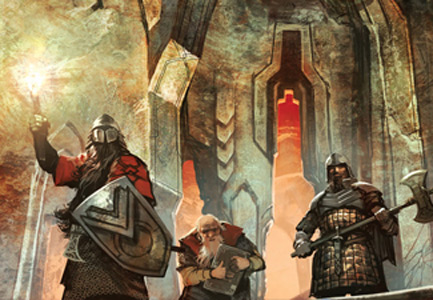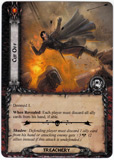Welcome to Card Game DB
Register now to gain access to all of our features. Once registered and logged in, you will be able to create topics, post replies to existing threads, give reputation to your fellow members, get your own private messenger, post status updates, manage your profile and so much more. If you already have an account, login here - otherwise create an account for free today!
Register now to gain access to all of our features. Once registered and logged in, you will be able to create topics, post replies to existing threads, give reputation to your fellow members, get your own private messenger, post status updates, manage your profile and so much more. If you already have an account, login here - otherwise create an account for free today!
Forging Your Fellowship 1: It All Depends On Your Viewpoint
Jun 25 2012 05:00 PM |
sirprim
in Lord of the Rings
Forging Your Fellowship Deckbuilding sirprim Welcome everybody to the very first of a series of articles about The Lord of the Rings:LCG by Fantasy Flight Games. The topics I am going to talk about will vary from card discussion or combo strategies to some ramblings here and there and maybe even some other topics in the future. But in the beginning I have to lay some groundwork for future articles first and so I shall begin with deckbuilding from my point of view.
Welcome everybody to the very first of a series of articles about The Lord of the Rings:LCG by Fantasy Flight Games. The topics I am going to talk about will vary from card discussion or combo strategies to some ramblings here and there and maybe even some other topics in the future. But in the beginning I have to lay some groundwork for future articles first and so I shall begin with deckbuilding from my point of view.Forging your fellowship is going to be my series about how I approach deckbuilding in LotR:LCG. I know that there are many ways to skin a cat (or Wargs (Core) for that matter) and I do not claim that my view is the end all be all way of deckbuilding. But maybe I can still get you to follow along and walk the path with me as I share my ideas.
So lets take the first step, shall we?
In the end it all comes down to creating interesting decks, but before we can do that, I have to share my viewpoint, my roadmap so to speak. Reading over different forum posts at BGG, FFG et al, I have found that players can be classified into three categories, when it comes to looking at the cards they are about to put in their decks. Each category has different pros and cons and I am going to list those as best as I can.
Group 1
The first group is on the lookout for a certain split of all three card types, their questions sound often like this: How many allies do I have to put into my deck? What percentage of attachments shall I use?
PROS: A reasonably simple approach, can ease people into deckbuilding with little to no prior exposure.
CONS: Your deck might end up not being ready to deal with all upcoming tasks.
As far as I can see this group usually is not inexperienced, they just come from a different gaming background, for example A Game of Thrones:LCG seems to has developed a rule of thumb that your deck should consider of roughly 50% characters, because they do have a somewhat heightened role in that game. And while some decks seem to stray from that number, quite a lot have 25-35 characters in a 60 card deck.
Group 2
The second group views their decks by the "stuff" their characters can do, which is represented in the three stats: Willpower, Attack and Defense. They usually ask themselves: How many cards do I use for questing? How many cards are attack-related ones? Do I have a good defense set up?
PROS: You will probably end up with a more balanced deck than group 1, because your cards have a certain purpose.
CONS: Since the Encounter Deck has been left out of the equation so far, it might be able to throw a big wrench in your plans.
Group 3
The third group switches the viewpoint upside down. Instead of focussing on your own cards, they ask what the Encounter Deck can do to their decks, which results in the three questions: How can I deal with enemies/treacheries/locations?
PROS: You have possible Encounter interactions already in mind when building your deck. And this viewpoint allows for some less-obvious strategies of deckbuilding (more on those later. Just as a teaser: consider a card like
Short Cut (TWitW), doesn't get much praise I hear. I think this is due because it doesn't fit in with the 2nd viewpoint as this card doesn't attack or defend and isn't directly questing either. Under the third viewpoint though, this card gets value, as it deals with locations. I guess I'll come back to that.)
CONS: You might end up on the extreme opposites of viewpoint one (almost no allies or nothing else than allies or similar), which can be OK if you know what you are doing, but has its own perils (Cut Off (TMaO) anyone?)
Now with all that being said, you probably guessed it already, that I advocate viewpoint three for deckbuilding. I think this opens up the most room for strategy, not that you can't reach any deck via different means, but asking "good" questions can be very beneficial in my opinion. Hopefully I can show you what I mean in future articles.
Whether you agree with my assumption so far or not, I encourage you to keep this focus in mind when reading the upcoming articles. A lot of the future theory will be going to be connected to the things I wrote down here.
So long,
Sebastian
P.S.: Which viewpoint have you adopted so far when building your decks? Have you tinkered with different approaches? Let me know.
- Voidy, Zaidkw and Reager like this



 Sign In
Sign In Create Account
Create Account












14 Comments
So... I guess for solo play my primary consideration is to build a utilitarian deck that works for almost all of the encounter decks. (Escape from Dol Guldur, I'm looking at you! *grumble grumble*) As such, I think I fall into the #2 heading.
However, I find that when I build, I'm not generally looking at stats, but rather at overarching strategies. (i.e.: Threat reduction/secrecy, card draw, questing, defense, attack, encounter deck scrying, encounter deck cancellation, resources, etc.) Sometimes with the right combination, you don't need to worry about something as mundane as defense stats, when you have cards that make it unnecessary (i.e. Forest Snare (Core), Feint (Core), or my personal favorite - Fast Hitch (TDM) Frodo Baggins (CatC) with threat reduction thrown in for good measure).
To simply boil it down to just will/defense/attack leaves out a lot of the fun abilities that are there to be played with...
I agree with your utilitarian approach (maybe I should have pointed out, that these articles are going in that direction) and I can assure you that cards like Forest Snare and Feint are soon™ going to be added to the equation.
*chuckle* I was just considering that usually in a cooperative game it's tempting (and sometimes beneficial) to completely forego certain aspects of game play (i.e. Attacking) to create more optimized specialty decks (i.e. Questing). Then your partner can have an optimized deck that can pick up the parts you left out.
Just different ways of creating decks, as you already point out!
I find myself personally in a fourth category in which it is more a "what kind of cool combos can I pull off" and build the deck around those combos (ala Shagga style in aGoT).
I do tend to agree that the article does seem a little skewed to Solo play deck building as it just talks about a player trying to build a good deck in three different typs without the consideration of partner decks. I tend to play a lot of 2,3,4 player games and always try and look at my partners decks and what they are trying to accomplish and build around weak areas that might be needed in our quest of choice.
We also tend to build decks first, play them against a scenario without prior knowledge to the scenario. If we fail, we go back to the deck building drawing board and rinse and repeat until victory.
But obviously building multiple decks at once opens up more opportunities for sure.
(Actually this could be seen as building one huge deck though *g*)
I see it this way: If you build your deck around a certain combo and it deals with one of the three encounter types, than this obviously falls under my three questions (lets say you play a deck with Hama (TLD) and Thicket of Spears (Core) than you have a deck which obviously revolves around a cool and crazy combo (Shagga, if you like *g*) and you are obviously dealing with enemies this way (as an answer to one of the three questions).
If, however, your combo revolves around resources, card draw or something similar, than this is just a means to an end. You are not going to win the quest on this combo alone, you will still need to have answers to locations etc. Your combo than is "just" there to fuel the rest of your deck. So in my view, have your combo in mind no problem, but answer my three questions first
I think it really must be something with my language (english is not my native language). I will talk about partner decks in the future for sure.
Maybe one point to clear it a bit up: When I ask you "How does you deck deal with locations (eg)?" I do not mean that you have to deal with them at all. The answer could very well be: "I don't deal with locations at all"
But whether you do this or that or nothing vs locations has to be cleared right away and not in the process.
Maybe this clarified a bit (not sure though *g*)
But they don't need they own categories as far as my articles are concerned. They just tend to answer the questions differently.
those are player types that can be in any of the group types that sirprim mentioned.
I find myself to be in group 3 although not 100% since I like to play blindly the first time against a new encounter deck using a previous deck and then once I've learned what the encounter deck throws at me I will build accordingly; and I agree with sirprim saying that it is the way to go, since your goal is to beat the encounter deck the and the best way of doing it, is to counter it accordingly.
I think even players in group 1 and 2 will eventually fall to group 3 if their decks fail since they will be tweaking the deck accordingly to the encounter deck they are facing.
Looking forward for this article series!
It does appear to me though, that I have to step up my language game big time. I did not intend my questions to sound like "How does my deck deal with these particular locations in quest X?", but rather like "How does my deck deal with locations in general?"
But anyway, I have already learned lots of stuff about writing articles (more than I expected, to be honest) and I will try to increase precision in my future topics.
Looks like we are sitting in the same boat anyway and I just misunderstood you a bit